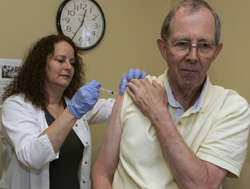H1N1 vaccine priority groups released
Last Updated: Wednesday, September 16, 2009 | 9:24 PM ET
CBC News
 People with chronic medical conditions under the age of 65 are among those who would benefit most from immunization, federal health officials say. (John Amis/AP Photo)
People with chronic medical conditions under the age of 65 are among those who would benefit most from immunization, federal health officials say. (John Amis/AP Photo)Canada released new guidelines Wednesday on who should be first in line for H1N1 pandemic flu vaccines.
The groups include:
- People with chronic medical conditions under the age of 65.
- Pregnant women.
- Children six months of age to under five years of age.
- People living in remote and isolated settings or communities.
- Health-care workers involved in pandemic response or who deliver essential health services.
- Household contacts and caregivers of individuals who are at high risk, and who cannot be immunized (such as infants under six months of age or people with weakened immune systems).
"Keeping in mind that we've ordered enough vaccine for every Canadian that needs and wants to be immunized, our basic approach is to ensure that those that need it most get it first," said Dr. David Butler-Jones, Canada's chief public health officer.
Setting priorities
Since the whole vaccine order won't be available immediately, those in the priority groups will be encouraged to access the first seven to 10 million doses that should roll out by the third week of October to mid-November at the latest, he said.
The list is not in order of priority, and it will be up to provinces and territories to interpret the guidelines based on their needs, Butler-Jones said. The list could also be revised as more is learned about the virus or if the virus itself changes.
Others who would benefit from vaccination include first-responders (e.g., police and firefighters) and poultry and swine workers. The priority is to protect public health and ensure a continuation of public services.
Vaccinations could start earlier if the flu surges and health officials are convinced the vaccine is safe.
Canada's swine flu vaccine manufacturer, GlaxoSmithKline, can produce 3.5 million doses a week.
While vaccine supply overall won't be issue, getting high-risk groups to roll up their sleeves could be a challenge.
Stephanie Thomson of Toronto is 25 weeks pregnant. Thomson said if if it were up to her, she wouldn't get vaccinated.
"Being pregnant, my immunity is down," said Thomson, manager of Rhonda Maternity. "I also have the baby to be concerned about."
The Public Health Agency of Canada's vaccine priority list is in line with recommendations made by the World Health Organization and U.S. health officials.
Health Minister Leona Aglukkaq announced 76 swine flu deaths have been reported in Canada as of Tuesday, up two from last week.
Rosier European forecast
Also on Wednesday, European health experts released a more optimistic forecast for the H1N1 flu pandemic.
Planning assumptions in September and June had stated that 30 per cent of the population could be affected by the new flu strain. The latest projection suggests that would be the highest likely figure, the European Centre for Disease Control and Prevention said.
Up to 15 per cent of people infected with the H1N1 virus could get quite sick, and one per cent will be hospitalized — half the previous estimate of two per cent of clinical cases.
Another change is that the agency now expects about 25 per cent of people hospitalized with the virus will end up in intensive care units.
The European centre said about 12 per cent of the workforce could be off at any given time.
On Tuesday, the U.S. Food and Drug Administration approved H1N1 vaccines from three manufacturers. The bulk of vaccines will be available in the U.S. by mid-October.
Federal health officials expect the first doses of Canada's vaccine will roll out in mid-November, but that could be accelerated if a second wave of the virus hits sooner.
